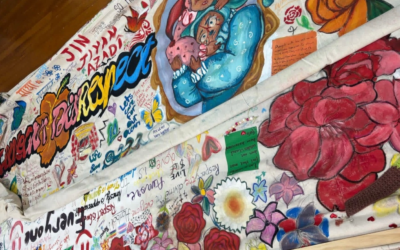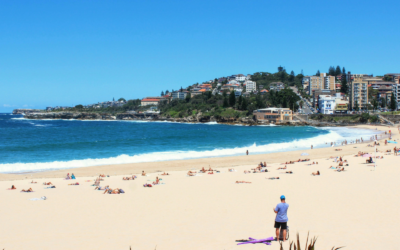In my experience at Western Sydney University, I always knew that I wanted to be a journalist. I’ve always had a passion for learning about the ways that society functions, the foundations and core beliefs that make us the people and places we are today.
However, I knew that within these foundations came inequalities and injustices that have been faced frequently within history and have continued to make a detrimental impact on the people, communities and places that cultivate our modern world.
In both my social anthropology and cultural and social analysis majors, I have always admired the ways journalists and scholars have documented these injustices. The ways they acknowledge the silent truth within society and highlight reality to show and bring change.
I admired how they wrote with such confidence in detailing the truth, bringing their research into the limelight and showing people a new perspective never explained before.
W’SUP Director, Natasa Aster Stater and I have discussed how being a journalist is kind of like being a detective, a person always searching for the truth to bring justice and peace.
However, my passion came with doubt. A doubt that because I did not go the traditional route of achieving a bachelor’s in communication or journalism. I thought I would never meet the standard of qualification in this competitive field.
Then I got the email that I was invited to join Western’s Student Publications Committee as an editor for W’SUP News. To say that I was happy was an understatement. I was absolutely thrilled, excited and scared all at once for this new change that I knew would be my foot in the door of this amazing and fast-paced world of journalism.
In my experience at the publication, I have learnt from my peers, grown within my writing and have gained confidence educating the public; from small media releases to important investigative pieces.
It has truly made me fall in love with the field and has solidified my stance that a career in journalism is where I am meant to be, despite all my nerves and doubts.
This journey came with triumph, but also hard work, learning from mistakes and practice. As my time as a Western student comes to an end, I decided to write about 10 lessons I learned as a W’SUP editor and journalist.
Taking Pictures:
Whether it’s an event you are attending or someone interesting you see on your way to university, take pictures of it all! One of the biggest lessons I learnt was truly the importance (and the absolute annoying pain) of copyright law and its impact in the accessibility of pictures within articles. Therefore, to save the hassle of extra training and legal risk, take your own pictures when covering events.
Furthermore, if you absolutely must facilitate pictures from another source, always reach out for permission and remember that stock image resources such as Pexels are always available at your disposal (but always remember to attribute)!
Work-Life Balance:
One thing I truly appreciated within my W’SUP experience was the mutual understanding the team had of knowing that life gets busy. People have other jobs or take on more workload while studying, all while trying to cover as much news as possible within each quarter.
Especially during exam and assignment periods, it is valuable to plan and schedule your time when you can draft articles. It is okay to say no sometimes when extra curriculars are taking up your time. Transparency and honesty are key and keeping your team in the loop about what you can and cannot take on is extremely vital to ensure yourself a healthy work life balance and a positive experience within the W’SUP team.
Have. Your. Receipts:
I will never forget a quote one of my tutors said in my first year as a humanities student, “you can write an essay about absolutely anything you want, but if you are going to claim something, you have to back it up.” This piece of advice has stuck with me throughout my degree, in my time as an editor and will continue to be relevant in my journalism career.
So, I bestow this wisdom to the readers: if you are discussing, engaging or writing about any person, event or place, always have a source to back up your claims. Your evidence is your truth and will be the most important part of any article. In summary, always have your ‘receipts,’ whether it be links or sources, ready and prepared at all times.
It’s What You Know and Who You Know:
It’s necessary to have your information and facts in an article or written piece. However, sometimes the most powerful source of information you have is a quote from individuals about the topic discussed.
Therefore, it is not only what you know but who you know. Using multiple sources, plus quotes in any article or journalistic piece not only reinforces the validity of your information but also shows the reader a different or supporting perspective. This makes the piece come to life and more engaging to read overall.
Promo, Promo, Promo!
If you want your work to reach a big audience and leave an impact you MUST promote yourself! I cannot stress enough how important promoting your articles on social media is in making your name known professionally. Promoting your articles can also create networking opportunities by having your articles mentioned or recommended, creating more opportunities for your work to reach more people and be showcased on a larger scale.
Feedback is Important:
Crafting your skill in journalistic or feature writing can be difficult, so while practice makes perfect, learning from that practice and taking on feedback is just as important. Sometimes in the furious battle trying to get words on the page, we forget to take the time to edit our own work. (I am sure even my own editors reading this piece are finding syntax or grammar issues). So, take any feedback given by your editors and learn from their suggestions. This will not only help you become a better writer and editor but reminds you to hone your craft, learn from your mistakes and remember that there is always room for improvement.
Versatility is Key and Practice makes Portfolios:
One of the biggest advantages any student can have is a versatile portfolio for future employers. Whether you want to work as a journalist, graphic designer or editor, having versatility in covering a diverse range of writing styles and stories will make your work stand out for future employment opportunities.
Taking on as many pieces, projects or articles as you can is essential not only to build your professional portfolio but also will teach you how to adapt into different styles of writing and reporting. This diversity will assist in making you a better editor and crafting a robust work ethic.
Connections are Foundations:
Being an editor means that you are expected not only to write and report your own stories but also collaborate within your team and with contributors as well.
These collaborations are fundamental for the publication’s reputation and can build strong networks and relationships for your career. During my time with the W’SUP team, I made it a priority to treat collaborators with respect and clear communication. I always ended our interactions on a positive note, expressing gratitude for the experience and opportunity.
Know You Have Support:
I struggled with this but once I implemented this, it was a life saver for my mental wellbeing and physical workload. Even though you may be writing an original piece, the researching, writing, editing or even the pitching can feel daunting, overwhelming and stressful.
That’s why it is extremely important to know that you have support. If you are struggling with your workload or even being a new editor, know that you have support and are never alone in your struggles. Communication, understanding and transparency can go a long way so always reach out to your peers and the supporting staff members if you need assistance and know that your team are there for you every step of the way.
Remember – Your Words Matter:
The most important lesson I learned is that the platform you provide for the people you feature, the topics you discuss, and the stories you cover truly matters. As journalists and editors, we have a duty of supporting and uplifting the voices of people we discuss, engage with and interview.
It is important to know that the way you write other people’s stories and experiences can and will matter. Always take care in your writing, remain objective and open-minded, and leave room for education, appreciation and conversation to flourish in your work. Remember that you take on the voices and stories you write about. So, handle every single story and perspective with respect and dignity in every article and word written.



